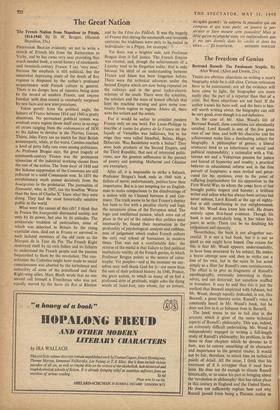The Great Nation
PROFESSOR BROGAN evidently set out to write a sketch of French life from the Restoration to Vichy, and he has come very near providing that much-needed book, a social history of nineteenth- and twentieth-century France. I say 'very near,' because the emphasis is still political, but the somewhat depressing study of the death of five regimes is deepened by the author's profound acquaintance with French culture in general. There is no danger here of injustice being done to the record of modern France, and anyone familiar with that record is constantly surprised by new facts and new interpretations.
Taken purely from the political angle, the history of France between 1814 and 1940 is pretty disastrous. No permanent political system was evolved; every regime threw itself away in an orgy of errors ranging from the ordonnances of 1830 to the failure to devalue in the Thirties. Guizot, Thiers, Jules Ferry are no match for their British counterparts, while, at the worst, Combes reached a level of petty folly rare even among politicians. As Professor Brogan says, the great tragedy of nineteenth-century France was the permanent alienation of the industrial working classes from the rest of the nation. The 'June days' of 1848 and the hideous suppression of the Commune are still reflected in a solid Communist vote. In 1871 the revolutionary myth passed decisively from the bourgeoisie to the proletariat. The journalists of Ilumanite, who, in 1947, ran the headline 'Worse than the laws of Charles X,' knew what they were tdoing. They had the most historically sensitive public in the world.
What were the causes of this rift? I think that in France the bourgeoisie dominated society, not only by its power, but also by its attitudes. The aristocratic tradition of paternalism, some of which was inherited in Britain by the rising capitalist class, died out in France or survived in such isolated members of the old caste as the Marquis de la Tour du Pin. The French Right ,destroyed itself by its own follies and its failures to understand the French people and the passion bequeathed to them by the revolution. The con- tribution the Catholics might have made to social consciousness was aborted by the turbulence and imbecility of some of the priesthood and their Right-wing allies. Marc Bloch wrote that no one should call himself a Frenchman who was not equally moved by the Sacre du Roi at Rheims and by the Fetes des Federes. It was the tragedy of France that during the nineteenth and twentieth centuries the traditions were only to be united in individuals—in a Peguy, for example.
Yet there was a brighter side, and Professor Brogan does it full justice. The French Empire was created, and, though the achievements of a Lyautey tend to be forgotten today, that is only because his ideal of an understanding between France and Islam has been forgotten before. There were the technical advances under the Second Empire which are now being repeated on the railways and in the great hydro-electric schemes of the south. There were the scientists, the scholars and the mass of honest officials that kept the machine turning and gave some con- tinuity from regime to regime. Above all, there were the writers and the artists.
For it would be unfair to consider modern France only on one level. For Louis-Philippe to inscribe A toutes les gloires de la France on the façade of Versailles was ludicrous, but in his reign they were called Stendhal, Balzac, Hugo, Delacroix. Was Baudelaire worth a Sedan? They were both products of the Second Empire, and the Third Republic, that nest of interested politi- cians, saw the greatest selflessness in the pursuit of poetry and painting. Mallarmd and Cdzanne are exemplary.
After all, it is impossible to strike a balance. Professor Brogan's book ends in 1940 with a failure of nerve; unfortunately, politics have their importance. But is is too tempting for an English- man to make comparisons to the disadvantage of a nation with no Channel between it and Ger- many. The truth seems to be that France's destiny has been to live with a peculiar clarity and logic the successive crises of the European mind. The logic and intellectual passion, which were out of place in the art of the relative that politics must necessarily be, found their incarnation in the profundity of psychological analysis and ruthless- ness of judgement which makes French culture the only real school of humanism in modern times. This was not a comfortable fate: the reverse of the medal is that failure to find political institutions worthy of the French genius, to which Professor Brogan points as the source of catas- trophe. Yet peoples—and at the moment we our- selves may well thank God for it—are more than the sum of their political history. In 1940, France, the great nation, to which so many of us feel a profound debt of gratitude, might echo the dying words of Saint-Just, into whom, for an instant
its spirit passed : meprise la pOussiere qui me compose et qui vows park; on pourra la per- secuter et faire mourir cette poussiere! Mais je defie qu'on m'arrache cette vie independante que je nie suis donnee dans les .sieeles et dans les










































 Previous page
Previous page